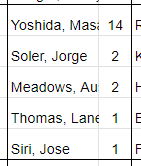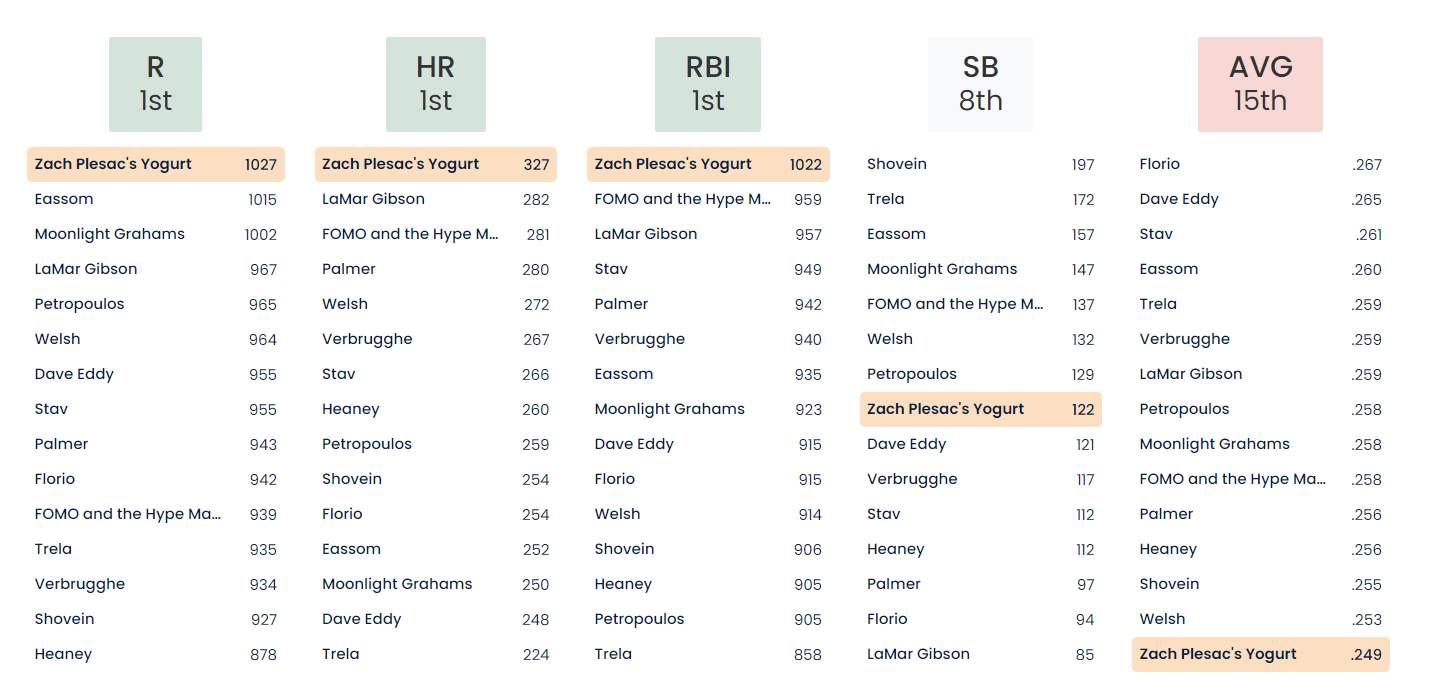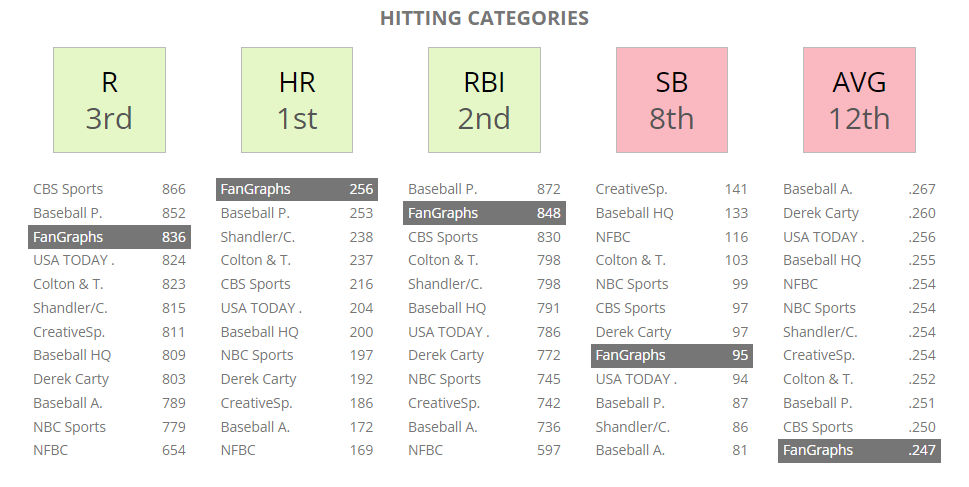My Imaginary $10,000 Quandary
This offseason, I struggled with how much fantasy-based content is too much content. I’ve created plenty of material including a 300-page book on my process and several articles per week here a FanGraphs. In addition to writing about fantasy baseball and playing in a few free leagues, I started dipping my toe into high stakes. The entries started out small but I’ve rolled my winnings back in and it was a sizable amount this spring.
With five figures on the line, I felt the pull of providing the best content available and being competitive in these leagues. This offseason, I had several takes. Some I made public while others, I sort of kept to myself. Here are three examples.
1. One of my guys this year was José Suarez (shares). I didn’t go into the offseason being high on him but liked some of his mid-season changes.
A complete transformation. [Suarez’s second half 18% K%-BB% is in line with Wood and his comps (Urias and Alcantara). He is a breakout in hidden plain sight. I would take Wood ahead of him (longer track record), but Suarez would be an easy second choice.
… I ended my campaign for him right then and tried to roster him in every league. While others noticed the article, I didn’t go out of my way to make him one of my guys.
If you want a sleeper SP, go read up what @jeffwzimmerman wrote up on Jose Suarez @fangraphs:
Sneak peek:
It gets better, too pic.twitter.com/iB9DTnMoXf
— Frank Ammirante (@FAmmiranteTFJ) January 27, 2023
Will Jose Suarez carry me to a fantasy title? Probably not, especially after his first couple of starts, but I had good luck targeting late-starting pitchers last season (e.g. Tyler Anderson and Nestor Cortes), so I thought, why not again?
2. Besides some player targets, I didn’t make my draft plan known. I’ve discussed streaming starters from my bench, but others are moving to this strategy so it’s nothing novel.
One strategy that did materialize after looking into my late-round sleepers was how I was going to target outfielders. While I didn’t have an issue drafting a top-five round bat, I knew I could wait on outfielders. The two most extreme examples are my $20 outfield in Tout Wars.

And one of my 12-team leagues where I drafted my third outfielder in the 24th round.

The late outfielder plan seemed to catch on and in a couple of my last drafts where outfielders were great buys and I was able to grab a couple Bryan Reynolds shares.
3. One final gamble I used was to focus on players who could see a shift-ban BABIP jump. I researched and wrote about the possible BABIP jump in The Process (release around January 1st). I didn’t see any movement in player values after the release, so I just kept adding the guys I suspected to be values. I backed up the projected BABIP bump with a private study someone paid me to create
For some players, I expected an almost 30-point increase in BABIP over their projection. While my projections showed my batting would be fine, publicly available projections hated the strategy as seen by these projected end-of-draft standings.


I didn’t publicly anchor myself to these beliefs but should I have? Compared to other analysts, I just don’t have that many outlets to pimp out my ideas. First, I’ve tried my hardest to quit giving out ideas and thoughts on Twitter (at least when I’m sober). I used to see people heading down what I see as the wrong path and correct but I don’t give two shits anymore. My job is not to provide free help on a free platform. Once I realized that, my life became better. While I will provide links to my work, I try to use Twitter less and less in relation to fantasy baseball.
The truth is, not many full-time baseball analysts put their own money into high-stake leagues. First off, I know that what is considered high stakes for some people isn’t for others. I was apprehensive the first time I spend the initial $300 into a couple leagues but didn’t blink dropping $10K this preseason.
Additionally, I’m of the belief that a little skin in the game never hurts to keep the league competitive. So how to balance providing content and being a competitive manager?
As I’ve worked through this article, the more I believe I just shouldn’t be a whiny ass bitch and just be grateful I have a job covering a game that I enjoy and am relatively successful at. If the past Jeff could have looked at the future Jeff, he would be happy about this part of his life.
Besides my opinion, I reached out to a few other analysts and got their take on the subject of giving out the best advice and trying to be competitive in high-stakes leagues. I asked them several questions and here are some of their responses. A big thanks to the group opening up to show their honest opinions
Do you think your content has hampered you in your high-stakes leagues? If so, how?
- It may be hampering me with some draft picks and some FAAB moves, but winning leagues and being competitive to cash does not revolve around one pick or one move. Lower stake leagues like Draft Champions have slow draft options and I feel that in those drafts is where I get “sniped” the most. It could be from those who listen to my podcast but I feel that it mostly comes from those who have been in my slow drafts prior and make sure to move a guy up a round or two or five (the late spec picks are where it happens most often- the big jump in grabbing a guy I like). -Rob DiPietro of the Pull Hitter Podcast
- It’s impossible to really know for sure. I assume most high-stakes players think for themselves or at least wouldn’t change their strategy/analysis based on something I said. Perhaps by submitting the super early top 300 rankings I’ve done the past two Octobers and writing a lot about prospects I like during the offseason can affect the ADP for some players in November, December and January, but I suspect any disadvantage from producing content is minimal or on the margins, especially by the time we get to March. -RotoWire’s James Anderson
- I can see my pitchers go one two three before my turn all the time. -The Athletic’s Eno Sarris
How do you deal with the possible disadvantage of having your ideas available for public consumption puts you at?
- Most high-stakes players pride themselves on finding the players on their own, and I’m not the FAAB whisperer or anything like that. I imagine it hurts you more than it hurts me. -RotoWire’s Jeff Erickson
- I just live with it. I need my job more than I need to win the maximum number of leagues, so I’d rather share the ideas I feel strongly about and build up a good reputation as an analyst than go out of my way to hold anything back. -Anderson
- Everyone is so well prepared these days it is truly hard to pinpoint if moves are being made solely around the content you provided- and if it is- and the player or strategy hits, well then there is super gratification that goes along with you being able to hand down good advice to others. -DiPietro
Is there a way you have tried to counter it?
- If I’ve been particularly verbal about a player, I’ll take him a round earlier on occasion, or bump up his bid in FAAB accordingly. I think I’ll also have a longer waterfall than I need on the off chance everyone is on my player. Sometimes the player is obvious enough anyhow, so it’s not as if my position is going to drive the bidding. -Erickson
- As I mentioned above, just being more prepared than everyone else. I try to be as honest as I can so in turn I must have a deep trove of ways to build successful teams, or teams of stats. -DiPietro
- I might reach a tiny bit on someone I’ve been publicly pumping up, especially if I’m picking near a turn and have a couple of picks close to each other. -Anderson
The group has done a better job than I have of coming to grips with their station in life. Some like Jeff Erickson have been doing it for years while Rob DiPietro is new to both content creation and high-stakes leagues. The conflict is there but they’ve found a way to just power through it.
While I thought diving into the push-and-pull of content creation and high-stake leagues would lead to some major insight, basically nothing has changed.
By focusing on winning, I was missing out on the best part of fantasy sports, friendships. Drafting in the leagues has led to me meeting some great people. I never knew Emmett Ruland or Dustin McComas before drafting next to them in the Main Event, but now I consider them good friends. And yes Emmett, we will find a way to get to Circa next year. And that’s what is important in life, solid relationships. Whether it’s people I work with or compete against or both, I’m going to remember these relationships more than if I finished first or tenth in a league or wrote some award-winning article.
I needed to just step back and remember I’m making a living covering and playing a game with many of my friends. Life could be so much worse.
Jeff, one of the authors of the fantasy baseball guide,The Process, writes for RotoGraphs, The Hardball Times, Rotowire, Baseball America, and BaseballHQ. He has been nominated for two SABR Analytics Research Award for Contemporary Analysis and won it in 2013 in tandem with Bill Petti. He has won four FSWA Awards including on for his Mining the News series. He's won Tout Wars three times, LABR twice, and got his first NFBC Main Event win in 2021. Follow him on Twitter @jeffwzimmerman.
I like the last few paragraphs. These are all just silly games we play, including baseball itself, but the people are real. Keep those good connections going as they are all that tangibly matter.